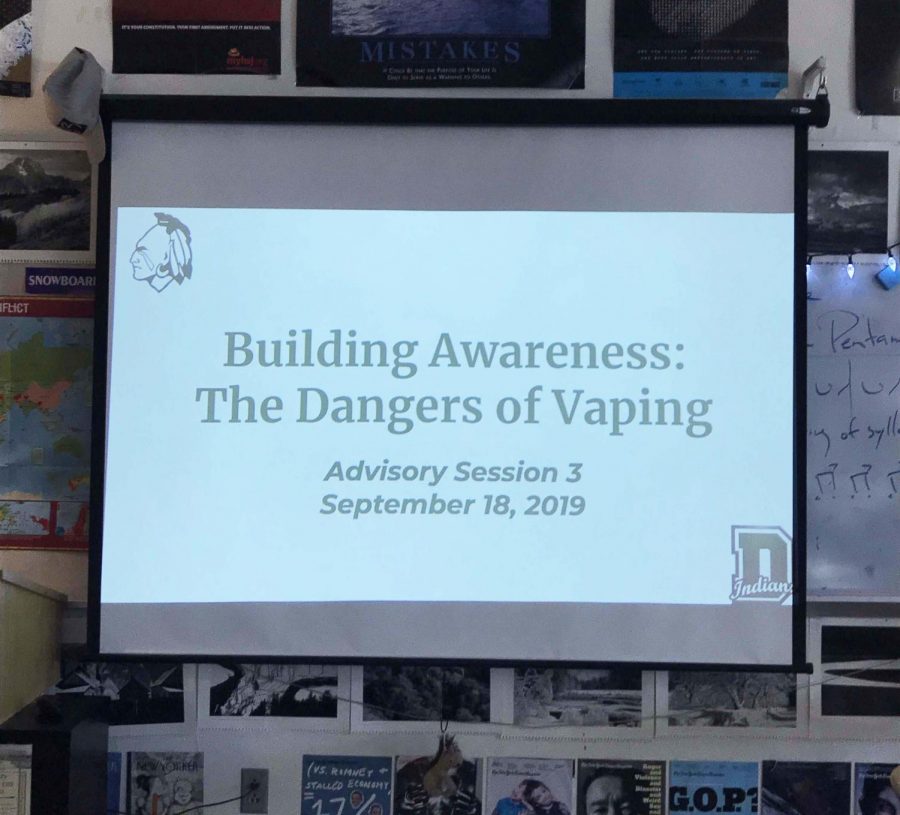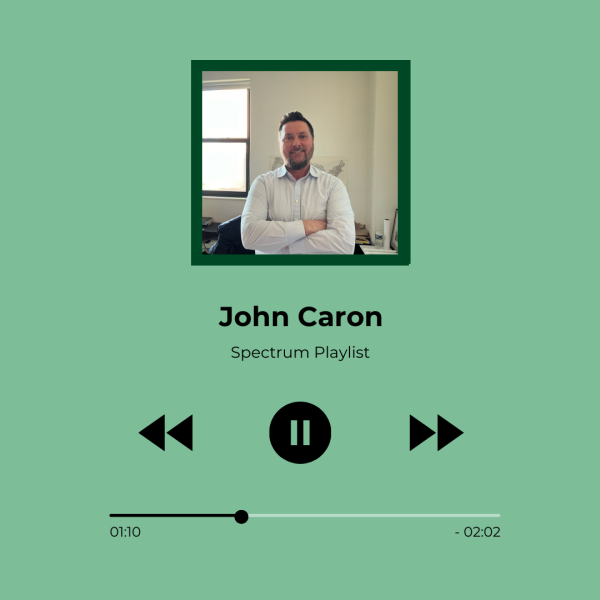Students weigh in on recent vaping advisory
The slide presentation about vaping took place on September 18.
The recent news of deaths and illnesses associated with vaping have spread like wildfire across all media platforms, and is predominantly affecting our youth in numerous ways. Problems like nicotine addiction and popcorn lung that is likely caused from flavored vapes containing the chemical diacetyl.
This information lead the DHS Advisory Team, made up of administration and faculty members, to tackle this topic. The team put together a presentation in order to create awareness, along with an open discussion forum that engaged the student body during advisory. Although the presentation had the intention of being an eye opener to the health risks of vaping, the reaction from students was mixed.
The ultimate goal of the recent advisory meeting was to make students aware of the dangers of nicotine. “We wanted to make sure before kids made harmful choices that they have all the information and health risks,” said English Teacher Jesse Grieve, who is also head of the Advisory Team.
From a teacher’s point of view, the ultimate intention of the presentation was to be helpful toward students. “It was more instructive rather than criticism against students who vape,” said English Teacher Jessica Lassey. This was evident in the presentation of which provided the opportunity to learn about the negative effects of vaping.
Was this the case for every advisory class though? Doug Bedard, a Social Studies Teacher said, “It was good for my advisory. Other classes who weren’t prepared or didn’t have enough participation would have been tough to come up with alternative strategies.”
What about the students already familiar with the impact of vaping, was it helpful to them? “It’s good they are trying to stop it, but the way they are doing it isn’t going to make a difference,” said sophomore Sofia Montez.
For a majority of students, the presentation lacked new content. The reality for many of them was that they exited out of their advisory room feeling the same as they did when they entered. “People have gained more knowledge, but it’s not enough to change their minds,” said senior Jacob Camara. The statistics that have been posted in the restrooms have lost their meaning. Students have now become immune to being concerned about a singular pod containing as much nicotine as 20 cigarettes.
The information presented in the slides felt short of the truth. In the presentation there was a video that showed a young man who had his lung collapsed, allegedly blaming the company Juul for his health situation. A majority of the key reasons for the illnesses associated with vaping aren’t due to Juul, and other solely based nicotine e-cigarettes.
Are Juuls the ones to blame for the recent deaths circling the news though? Although it is still unknown, most of the recent deaths have been linked to people who vaped THC. The focal point of the slides was focused on nicotine based products, rather than the fake THC vaping cartridges causing these deaths. Most students view it as a safer alternative than nicotine products. “I thought dab pens were safer than Juuls,” said an anonymous student.
Since the presentation, certain measures have been instituted at the state level. Massachusetts Governor Charlie Baker has put a temporary ban on all vape products that is expected to last through the end of 2019. If fake cartridges are to blame, why did Governor Baker place this ban? Consequently, this will put legitimate vape shops out of business, resulting in the opposite reaction government officials were anticipating and may cause an increase of black market vaping products, along with the selling of fake cartridges. With the new ban in place, users of these products could seek bootleg vape products from unknown production companies.
Vaping is affecting our society, predominantly teenagers. Juuls and nicotine products cause severe harm to our youth and should be discussed throughout schools. Hopefully, in the next presentation they will address the feedback students generated during the advisory meeting. Perhaps, a group of representative students could be involved in the planning of the next advisory presentation.
“It seems like it’s going to be a prevalent topic going forward. There will definitely be a follow up on vaping,” said Mrs. Grieve.












